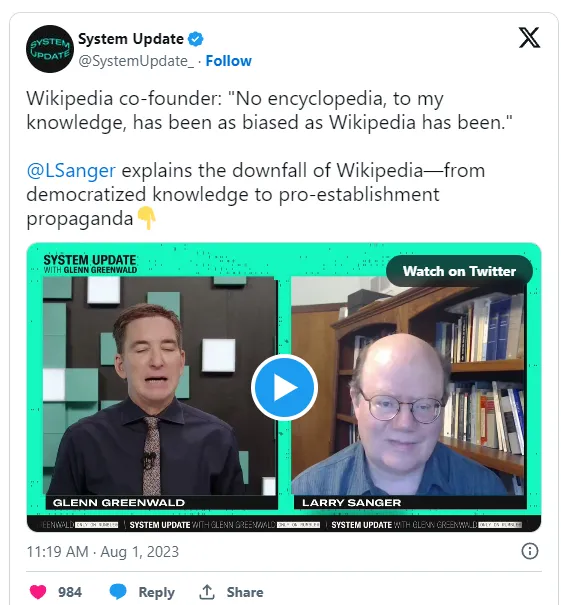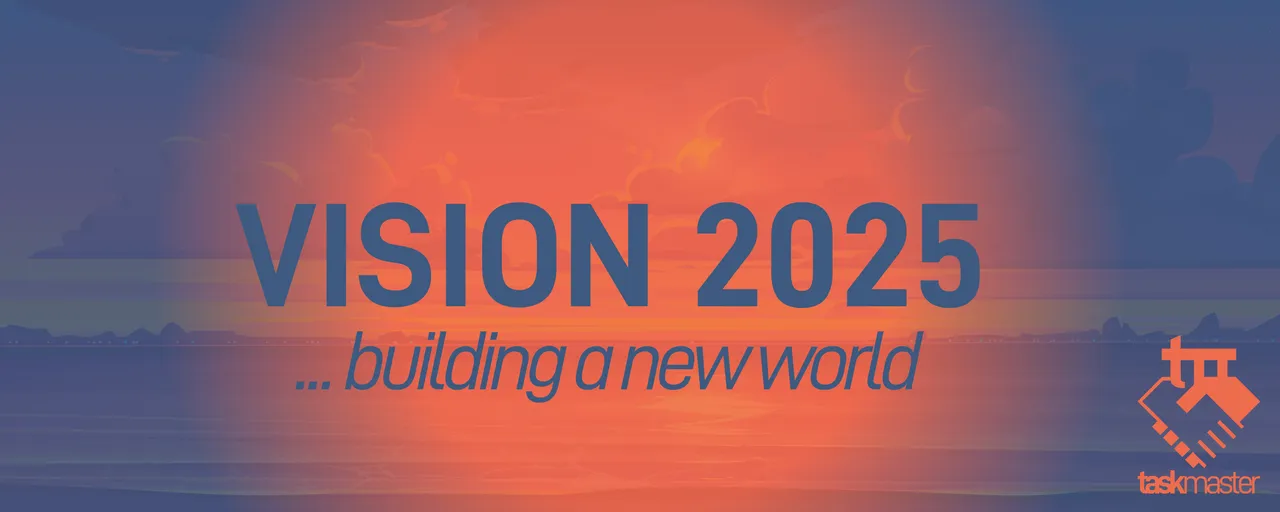In the past, we discussed the idea of building a Wikipedia on Hive. This is something that utilizes the decentralize database offered by blockchain. Since Hive can store any text page, this is ideal for anytime of glossary or information repository.
Obviously, Wikipedia is a mammoth site. This was started in 2001 and grown to almost 6.7 million pages in just the English version. The entire database is more than 60 million pages.
The size of this is without question. What is starting is some debate is the service it provides. When it comes to an encyclopedia, how does it rank?
According to one of the co-founders, not very well.

Pro Establishment Propaganda
Larry Sanger was there at the beginning. He understands the vision, and the value, of a community driven resource. This is in keeping with the original ideals surrounding the Internet. The democratization of information was a primary goal.
While this happened to a degree, the tweet above shows how he feels about the direction it took. It is now part of the establishment, serving as mostly propaganda.
This is not surprising since that is what happens with most media outlets. Governments, or more accurately those in control, take over the message, pushing it upon the masses. After the face, people claim they did not know and that is somewhat true. The idea that people get brainwashed is easy to see.
Today, the establishment likes to use the term conspiracy theory. Of course, it is startling when these start to emerge as truth, noting how the mainstream message was indeed nothing more than propaganda.
Wikipedia is a centralized entity. This means it is susceptible to the influences of those wielding power. It can come in many different forms but, in the end, the result is the same.
Decentralized Solution
With Hive, anyone can post a page to the blockchain. This is where data can come from anyone no matter where they are in the world. Also, no permission is required to post. The servers are not run by a centralized company. Whatever is posted will reside on the blockchain.
Here is where the potential exists to create something outside the control of the establishment machine.
Instead of people going to Wikipedia to edit things, individuals interested in this can simply start adding content to the blockchain. This could some through a series of articles regarding a particular topic of interest. In fact, there need not be any correlation between the content.
Over time, as more people create databases, they can be merged into an application. This can pull the data from whatever accounts are participating. Suddenly, the Hive-o-pedia could have 10,000 pages in it. Then, a year late, maybe it is 100K. Perhaps it moves to 500K. And so on.
The point being that people can keep adding pages to their own database as time passes. All the data is at the base layer. This means that it is available to any application that wants to utilize it. If there was an "attack" on the first application, others could be set up. We really see the power of this if it is open source software.
Centralization = Power (Abuse)
We all know the establishment loves centralization. The hierarchical structure is ideal for power and control. It is what allows the few to influence the many.
A project like Wikipedia is ideal for this purpose. Millions of people turn to it each day. Most of the pages are harmless and cover subjects that provide accurate information.
However, this is not the full picture. Certain pages will be written in such a way that tilts the conversation in the direction desired.
Wikipedia is basically a monopoly. This is the problem. Many feel that it neutral since it is community based. The challenge here is, according to one of the co-founders, it simply is not true.
It is interesting to note that Wikipedia started with the idea of decentralization. The concept of people editing and adding pages was novel. These were not employees. Instead, they were individuals who were interested in providing a database of information for the world to utilize.
And over the years, it did a good job on this end.
However, the one overriding issue is the fact that Wikipedia is centralized. This is true in terms of the infrastructure as well as the corporate structure. It is easy to see how the power mechanism could shift.
To parallel this, we saw the same thing happen with OpenAI. That project was completely hijacked by Microsoft. It started out as an AI project for humanity and now is under the control of one of the largest corporations in the world.
This entire discussion always reverts back to the data. Who is in control of the data? On Hive, the answer is nobody.
Here is why it is the ideal solution for an alternative. Anything that is posted to the database is available for all to use. Since there is transparency, all edits and updates are resident on-chain. Here again, anyone can follow along and see how things were altered over time.
How To Start
Some question how to start. It is rather easy.
Simply set up an account to use to post content around a specific topic. The idea is to have consistency in the way the pages are aligned (meaning the URL). Keep it page aligned in this regard since it is easy to use in the future.
Once the account is set up, start writing content around what you know. If it is the history of Birmingham, then keep adding to the database. Link the different pages together as terms start to appear. This helps the search engines.
If the topic is niche, after a certain number of articles, it will start to rank in the search engine. This starts the process of Hive as a reference center.
Having dozens of people doing this can lay the foundation for something bigger over time. The question is will people start the process?
Once again, Hive provides a solution that is not really offered throughout the rest of the blockchain world.

logo by @st8z